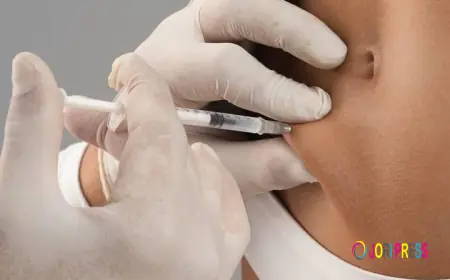What Does Recovery Look Like in Mental Health Treatment?

Mental health treatment is a journey, not a destination. Recovery varies from person to person, but understanding what it entails can provide hope and direction for those seeking support. Whether managing anxiety, depression, or other mental health conditions, recovery is about progress, resilience, and finding balance. This article explores what recovery looks like Mental Health Treatment Dubai, the stages involved, and how individuals can build a fulfilling life while managing their well-being.
Understanding Recovery in Mental Health Treatment
Recovery in mental health treatment is a deeply personal experience. It doesn’t always mean the complete absence of symptoms but rather the ability to live a meaningful life despite challenges. Many people find that recovery involves learning coping strategies, building a strong support system, and developing self-awareness.
The Meaning of Recovery
Recovery is not a one-size-fits-all concept. For some, it may involve regaining full functionality, while for others, it’s about managing symptoms effectively. Key aspects include:
-
Improved daily functioning – Being able to work, maintain relationships, and engage in hobbies.
-
Emotional resilience – Handling stress and setbacks in healthier ways.
-
Self-acceptance – Recognizing personal strengths and limitations without judgment.
Common Misconceptions About Recovery
Some believe recovery means never struggling again, but this isn’t realistic. Mental health treatment focuses on progress, not perfection. Another misconception is that recovery is linear—many experience ups and downs, and that’s completely normal.
The Stages of Recovery in Mental Health Treatment
Recovery often follows a non-linear path with several overlapping stages. While everyone’s journey is unique, these phases provide a general framework for understanding progress.
Awareness and Acceptance
The first step in mental health treatment is recognizing that support is needed. This stage involves:
-
Acknowledging symptoms and their impact.
-
Overcoming stigma or self-doubt about seeking help.
-
Accepting that recovery is possible with the right strategies.
Stabilization and Treatment
Once a person seeks mental health treatment, the focus shifts to stabilization. This may include:
-
Engaging in therapy to understand triggers and coping mechanisms.
-
Developing a structured routine to promote stability.
-
Learning grounding techniques to manage acute symptoms.
Growth and Skill-Building
As stability improves, the emphasis moves toward long-term growth. This phase often involves:
-
Strengthening emotional regulation skills.
-
Building healthier relationships and boundaries.
-
Exploring personal goals and values to create a fulfilling life.
Maintenance and Ongoing Support
Recovery doesn’t end after initial progress. Maintenance is crucial for sustained well-being and includes:
-
Regular check-ins with mental health professionals.
-
Continued use of coping strategies in daily life.
-
Adjusting approaches as life circumstances change.
Key Components of Successful Mental Health Treatment
Effective recovery relies on multiple factors working together. A holistic approach ensures that all aspects of well-being are addressed.
Professional Support
Therapy and counseling play a vital role in mental health treatment. Different approaches, such as cognitive-behavioral therapy (CBT) or mindfulness-based techniques, help individuals reframe thoughts and develop healthier behaviors.
Social and Community Support
A strong support system accelerates recovery. This includes:
-
Family and friends who provide encouragement.
-
Support groups where shared experiences foster connection.
-
Community resources that promote mental well-being.
Self-Care and Lifestyle Adjustments
Daily habits significantly influence mental health. Important practices include:
-
Regular physical activity to boost mood and reduce stress.
-
Balanced nutrition to support brain function.
-
Adequate sleep to improve emotional regulation.
Personal Empowerment and Advocacy
Taking an active role in recovery leads to better outcomes. This means:
-
Educating oneself about mental health conditions.
-
Communicating needs clearly to healthcare providers.
-
Advocating for mental health awareness in personal and professional circles.
Signs of Progress in Mental Health Treatment
How can someone tell if they’re moving forward in their recovery? While changes may be gradual, certain indicators suggest positive growth.
Emotional and Behavioral Changes
-
Fewer intense mood swings or prolonged periods of distress.
-
Increased ability to manage stress without resorting to harmful coping mechanisms.
-
Greater self-compassion and reduced self-criticism.
Improved Relationships
-
Healthier communication with loved ones.
-
Setting and respecting personal boundaries.
-
Feeling more connected rather than isolated.
Functional Improvements
-
Better focus and productivity at work or school.
-
Re-engaging in hobbies and social activities.
-
Feeling motivated to pursue personal goals.
Challenges in the Recovery Process
Recovery isn’t without obstacles. Recognizing potential setbacks helps individuals navigate them more effectively.
Relapses and Setbacks
It’s common to experience periods where symptoms resurface. Rather than seeing this as failure, mental health treatment emphasizes learning from these moments and adjusting strategies accordingly.
External Stressors
Life events—such as job changes, loss, or relationship struggles—can impact mental health. Building resilience helps in adapting to these challenges without derailing progress.
Stigma and Self-Doubt
Societal misconceptions about mental health can create internalized shame. Overcoming this requires self-education, support, and affirming one’s worth.
Long-Term Strategies for Sustained Recovery
Maintaining mental well-being is an ongoing process. Implementing long-term strategies ensures continued growth and stability.

Consistent Mental Health Treatment
Regular therapy sessions or psychiatric check-ins help monitor progress and address new concerns early.
Mindfulness and Stress Management
Practices like meditation, deep breathing, and journaling foster emotional balance and self-awareness.
Building a Meaningful Life
Recovery thrives when individuals engage in activities that bring joy and purpose. Volunteering, creative pursuits, or career development can enhance life satisfaction.
Final Thoughts on Mental Health Treatment and Recovery
Recovery in Mental Health Treatment in Dubai is a dynamic, evolving process. It’s about more than symptom management—it’s reclaiming a fulfilling life. With the right support, strategies, and mindset, individuals can navigate challenges and thrive. If you or someone you know is on this journey, remember that progress, not perfection, is the goal. Every step forward, no matter how small, is a victory worth celebrating.
By understanding what recovery looks like, those in mental health treatment can approach their journey with hope and confidence. Whether through therapy, lifestyle changes, or community support, a brighter, balanced future is possible.
What's Your Reaction?
 Like
0
Like
0
 Dislike
0
Dislike
0
 Love
0
Love
0
 Funny
0
Funny
0
 Angry
0
Angry
0
 Sad
0
Sad
0
 Wow
0
Wow
0



















































